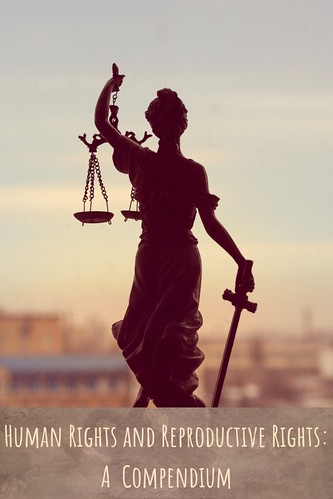“Health care isn’t controversial, it’s a Human Right”
~ MSP Gillian Mackay
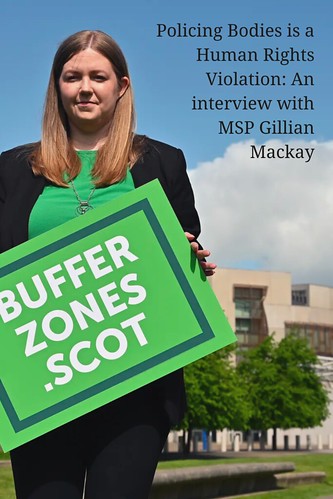
The Constitution of the World Health Organization states,
The enjoyment of the highest attainable standard of health is one of the fundamental rights of every human being without distinction of race, religion, political belief, economic or social condition
In Scotland, 70% of women of reproductive age live in a health board area that has been targeted by anti-choice protests in the past 5 years, subjecting both those accessing reproductive services and those providing them to harassment, intimidation, and judgment.
How is action taken to ensure human rights in Scotland? Why is it crucial?
In May 2022, Green MSP (Member of the Scottish Parliament) Gillian MacKay proposed a Member’s Bill to the Scottish Parliament to introduce safe access zones around healthcare centres that provide abortion services. If passed, the bill would prohibit any group, both pro-choice and pro-life, from gathering within 150 meters of the centre. Additionally, the bill would establish new legislation criminalizing the breach of these zones. Between May and August 2022, there were over 12,000 consultation responses, with the First Minister Nicola Sturgeon committing to working with Gillian on the bill.
Whilst buffer zones exist in other countries, a nationwide policy would be groundbreaking for both human rights and for the privacy and safety of those accessing reproductive healthcare.
Recently I was given the fantastic opportunity to talk with Gillian, and to discuss reproductive rights, her proposed Member’s Bill, and some of the ways she feels reproductive healthcare can be furthered within Scotland. Here's what she had to say...

Why, for you, are reproductive rights so crucial for everyone to be able to enjoy?
I think a lot of it is about bodily autonomy, the ability for people to make those decisions about what they do with their own bodies—and ultimately, with reproductive rights, what they do with their lives after that decision, too.
I think, particularly around my Member’s bill, it’s about access to health care, and that’s at the core of what this is all about for me. It’s about access to those services that are legally available, freely available, and that people should be able to have access to.
Reproductive rights is one of those areas, unlike some other areas of health care, where we see a debate around when they should be available, who they should be available to, what cutoffs there should be, and all these other things.
It’s highly gendered, and that shows in how it's debated and opposed. It’s a very important area for all of those reasons, as well as the importance of being able to support people to make the appropriate decision for them at the appropriate stage in their life.
What factors do you see as crucial for continuing the development around reproductive rights? What is essential?
I would really like to see the decriminalisation of abortion. There’s been some good conversations in Scotland around that, and that’s certainly somewhere I hope, if not in this session, certainly early in the next session, the Scottish Parliament will get to.
I think given what we’ve seen in the US and how quickly these rights can be rolled back, there is very much that feeling in Scotland (and probably more widely in the UK) that it’s not good enough to stand still and hope that your rights won’t be the next ones up. If we demand to go forward, it's much more difficult to roll things back. Late term abortion in Scotland is something that we need to work on; there are processes and systems in place that are being better communicated to people, which is a step forwards, but being able to actually provide them in Scotland is something that I know the Scottish government is working towards.
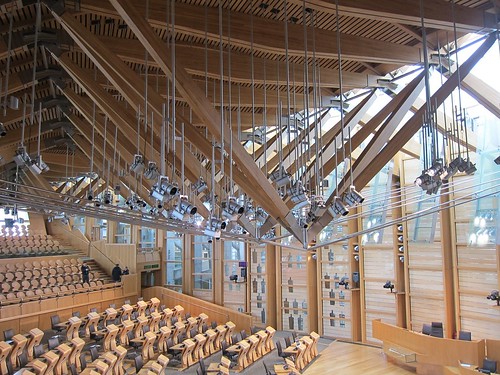
I was very heartened with the discussion that went on within the first summit that the First Minister held around that direction of travel. I'm heartened that we’re definitely on a journey towards a more robust system of reproductive health care. When it takes so long for rights to be instilled and legislated for, how quickly they can then be taken away is such a stark contrast. Naturally this is a worry for people.
You talked about the importance of moving forwards so reproductive rights aren’t rolled back. Recently, globally there have been significant restrictions, for example, the overturning of Roe v. Wade in America, and last year Poland implemented an amendment to their legislations governing reproductive freedoms. To what extent do you think in Scotland it can be guaranteed that we won’t also move in that direction?
I think that’s an interesting one. I think the situation in Poland and in the US actually shows that people need to really pay attention when they are critiquing candidates for election, because that is where the change can come in quite rapidly. By not critiquing what people stand for as a whole (and naturally I think a lot of the public have issues that are core to them), a lot of the time in Scotland it’s on the Constitution and things like that, but, if you don’t look deeply at who people are and what they stand for, what their party stands for, what their ethos is, people can vote in someone who looks fine on paper, and then suddenly they’re rolling things back.

As we’ve seen in the US, people can be instilled in certain places and then cause problems long after the president that put them in is gone. This format is less likely to happen in Scotland and the UK because of the set up of the political system, but I don’t think we can ever take for granted that you can end up with a government that wants to take those rights away.
I think the real warning to people should be: that point where you are looking to put an ‘X’ against someone's name or someone's party, do your research and look at who these people are. You could inadvertently end up with someone attempting to take your rights away because people didn’t look deeply enough at who these people are.
In your Member’s Bill, you stated that this isn’t a moral debate about the right or wrong of abortion. What, for you, is at the heart of what you are proposing?
It's about access to health care. These protests, and whatever else people would like to call them, are causing harassment, fear, and alarm for the people attending—not just these services, but other services, too.
This isn’t about whether you think abortion is right or wrong; it's about whether you think people should have access to services that are provided legally via the NHS, and that comes back to bodily autonomy. If it's available, and people are legally entitled to access it, they should be able to express their bodily autonomy in the same way they can turn round to any other specialist consultant and say, “I would like treatment option A, and not treatment option B.” That’s essentially what people are picking between: treatment option A, you continue a pregnancy and have a baby, or treatment option B, you don’t, you have an abortion—and that is your choice.

For some people, very sadly that’s obviously not a choice; it's somewhere they’ve come to because of medical complications. I think one of the pieces we’re often missing from this are the people who have to have medical interventions because of a miscarriage. They will often be attending the same building as anybody else who is running this gauntlet, but I’ve been very clear throughout the Member’s Bill process that no matter why you are going to that service and accessing that service, you should be able to do so free from intimidation and harassment.
There’s been a lot of talk about restricting the right to protest, and we don’t take this lightly. We do not take what we’re doing lightly. Equally, there is an appropriate place to protest, and that's outside Parliament, or speaking to me outside Parliament…it’s not trying to intimidate vulnerable people who are going for medical services.
We’re really hopeful that this is going to pass. The biggest hurdle for this piece of legislation is the inevitable legal challenge we’ll see at the other end.
Within your Member’s business and the proposal itself, you had first-hand testimony from people who have experienced these protests, including patients of clinics and the doctors who work there. Particularly poignant were the accounts of people who were not there electively, and how they were made to feel. Why is it so crucial that everyone receives additional protection?
One of the things that we occasionally gloss over is the impact on the staff. They’re the ones who are in the building day in, day out, dealing with patients who are traumatized as a result of what they’ve seen outside. I say this in every debate I do that touches on the staff team of the NHS; they’re incredible! Particularly in that setting where people can be very upset for a variety of reasons, and then additionally have had to run that gauntlet outside. The staff also have to run that gauntlet, being called murderers; it’s horrendous. Staff who are doing their everyday job with the utmost compassion and professionalism, and having to ignore the factors outside.
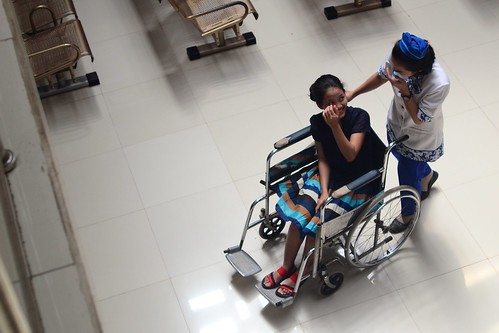
For some of the people we’ve spoken to, it is about removing some of that trauma for people who are going for an abortion un-electively. Even for people who are making that choice electively, there are a whole spectrum of reasons as to why, and none of that is up for anyone else's judgment. It’s nobody else’s business why they are having that abortion, so why they should have to run that gauntlet outside past protestors that are judging them for their decision? It’s horrendous. Again, if it was a choice in any other specialism, no one is standing outside saying “no, you should have an operation, not radiotherapy,” so why are we allowing it for abortion services? It just blows my mind.
There’s a level of anonymity, particularly on larger hospital sites. People can be going into a hospital for whatever reason; they could be visiting someone or attending an outpatient appointment, and it gives them that level of anonymity to go about their business without being a target. But we’ve heard from some people that they were almost being monitored going in and out of the building. One story in particular, where a couple were going in, the woman’s partner came back out and was then approached by the protestors saying “we can help you, you don’t have to say you’re okay with this,” and the partner was really frightened. They were watching and almost taking note of who was coming in and out of the building and then deciding which people to approach. It adds to the level of sinister that their presence can have; it’s an example I don’t repeat often.

As a Parliamentarian, there is a duty to not cause additional fear; it’s incredibly difficult to call out the behavior and not cause a debate, or further the distress that impacts people accessing services. Particularly around specific sites that do really good trauma work and work with vulnerable groups, it’s trying not to cause those additional anxieties so that people do go and seek that help they need.
My biggest concern with all of this is that it puts people off accessing the services that they are entitled to, and it's something I’ve spoken very strongly to other Parliamentarians about. We need to continue to repeat—this is a service you are entitled to; if you need it, please use it.
One element of your bill talks about the dangers of a possible ‘postcode lottery’ if protection measures are allowed to fluctuate. Why would new legislation at a national level be much stronger in supporting reproductive rights?
There was an anxiety from the Councils that whatever they do is going to be challenged. Organizations like our colleagues in the US have very deep pockets; they could keep a local authority tied up in litigation for a long time, which will then most likely impact local services, which is absolutely not what we want.
Councils and campaigners also didn’t want to see a change in local political leadership result in rights being removed or elements put in. Additionally, there’s the potential burden on councils of time and the restrictions of bylaws. I know that’s something that’s being explored in the meantime to see if, around particular sites that see a high level of activity, something could be put in temporarily, which would be extremely useful because as long as people are protected. That's the end goal. I do not need a bill with my name on it to achieve what we need to achieve. If we can do it through bylaws and other ways, have at it, that’s fantastic.
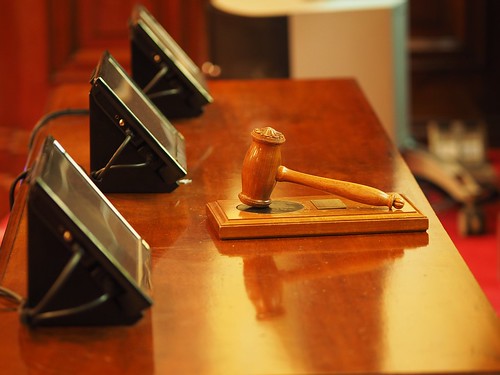
A person should be able to know what to expect, whether they are in Highland or West Dunbartonshire, Central or Edinburgh. The bill proposes 150 meters, that won’t be enough for some hospital sites (Glasgow Royal in particular—150 meters will put them at the nearest bus stop, which is not helpful).This is more difficult logistically to ensure that people's journey from the car or from public transport is not affected by these protests, too. There may be a mechanism there for individual authorities to pass a bylaw to extend the zone, but not reduce it. That way, everyone can enjoy a minimum expectation. Working with local authorities, the ultimate goal is for everyone to be able to go, “oh, there’s nobody here.”
Within your proposed Bill and Member’s Business in Parliament in November of last year [2021], you consistently use the language “women, and people who are pregnant.” Why is this shift towards open language so important?
I think because one of the other most controversial pieces of healthcare that we deal with is gender identity healthcare. It has to reflect the way society is now; there are people who can become pregnant who do not identify as women, and that’s okay. That comes back to it being their choice—and again, the absolute crux of this issue, it’s about bodily autonomy, just as much as the ability to access abortion services are. It’s been so heavily stigmatized that it needs to be fought for. It has its own problems, and we’re doing a lot of work on reforming the model, right from GPs up to the gender identity services themselves. It’s about valuing people for who they are, and for the decisions they want to make about their own body. Similarly to abortion services, that comes back to, “its not anyone else’s business.”
It’s very interesting. People see my proposed bill as an assault on their rights, others see the empowerment of people to be able to access services. I think it’s very sad that we’re at a point where people see an “us and them,” and not an empowerment of marginalized people. There’s no real freedom till we’re all equal, that’s at the heart of it. I think we’re in danger of perpetuating a harmful cycle, rather than sitting there going, people are people. Let people live their lives, and let’s give them the health care they deserve, and the recognition that they deserve that allows them less trauma. There’s just too much heat around this topic, when actually it's quite a simple thing; the language in this bill is very deliberate because it has to be.

We need the chamber to look like Scotland. At the moment it doesn’t quite, we’re getting there but it's not quite there. I think the next step is making sure we’re not just doing things for the trans and non-binary community, but making sure they’re in the room and being able to themselves influence change.
Lastly, If someone were to want advice, to learn more, or were maybe nervous about accessing their reproductive health care, what would be your advice?
In the first instance, I’d say speak to the clinicians that are looking after your healthcare, particularly if it's about services that are available or what you can access in your local area. If your GP doesn’t know, they will know who best to refer you to. There are some really good organizations, the likes of Engender, or BPAS, who are excellent at signposting and supporting people if going down the medical route is something a person isn’t comfortable with.
Ultimately, if those options are not options that you want to take, write to a representative that you feel comfortable with. Whether that’s a counselor or it’s an MSP, we will always do our utmost to help, and to point you in the right direction of where you might get the information you need. Particularly if it’s about access at the moment, we can point you in the direction of the formal buddying services and the charities that do that, who can hopefully lessen some of that worry about accessing services.

In getting information, there is no wrong door. Just because you don’t go through a clinician doesn’t mean you’re not going to get the right information, or sent to the right place if you don’t want to go to your GP. There are plenty of places you can get help anonymously as well, if your home situation means that you don’t want to be identified. Your representatives will always take that into account, no matter what service you go to…it's on your terms. No matter what, you can start, stop, or alter any interaction you want to; it’s about making sure you get the end result that you want.
The complete Proposed Abortion Services Safe Access Zones (Scotland) Bill can be found on the Scottish Government website, and although the response period has ended, you can follow along with Gillian’s progress through her social media, or the Scottish Greens Website:
Scottish Greens Website - https://greens.scot/
Twitter - @GillianMacMSP
TikTok- @gillianmackaymsp, @scottishgreens
Alternatively, MSP Gillian Mackay can be contacted via email at Gillian.Mackay.msp [at] parliament.scot
It is clear that safe access zones are both invaluable and necessary in furthering reproductive rights and human rights in Scotland. By ensuring the safety of both patients and staff, we can minimize the trauma that so many individuals currently experience. I would like to thank Gillian for the incredible opportunity, and for such an open discussion. It highlighted for me both the stark need for increased protections, and the intimate complexities implementing these protections will have.
If you would like to access any of the reproductive services discussed within this interview, please find the details below, or contact your local GP.
Engender - https://www.engender.org.uk/
Telephone - 0131 558 9596
BPAS - https://www.bpas.org/
Telephone - 03457 30 40 30
Email- info [at] bpas.org
Scottish Women's Rights Centre - https://www.scottishwomensrightscentre.org.uk/
Telephone - 08088 010 789
Please click the photo below for a compendium of my Human Rights and Reproductive Rights columns:
Emma Fitzsimmons is the Human Rights and Reproductive Rights Editor at Wandering Educators. Motivated by the desire to make a positive impact in the world, she recently completed a masters degree in Human Rights and Diplomacy. She is very passionate about reproductive rights and the equality of all people.

